How to Participate
Already participating in the data collection?
If you cannot find your login information for the database, please get in touch with us via
Information for future centers
Your center is not yet participating in the EU-ROP project but you are interested in it, then please contact us via: contacteu-roporg
Both the number of study centers as well as the number of patients to be included into the registry are not limited.
All centers located in geographical Europe treating infants with ROP are eligible to apply for participation. The project has been approved by the Ethics Committee at the University of Greifswald, Germany. Still, each individual center needs to get approval from the local Ethics Committee before patient data can be entered from the respective center. Data entry must be in accordance with all national guidelines regarding data collection, storage and sharing. The EU-ROP project management can provide support for the necessary steps regarding Ethics Approval and Data Safety. For more information please contact us: contacteu-roporg
Please note that there will be no reimbursement for the participation in the registry. The project management can support centers with costs for Ethics submission if needed, but no fees for patient recruitment or data entry are paid. The motivation to participate should be a scientific interest in collecting and analyzing ROP data and jointly publishing scientific papers that help to improve ROP care.
Why participate?
ROP requiring treatment is relatively rare at most hospitals and thus individual centers have a very limited number of treated patients per year. Questions like “Which treatment is best?”, “When should post-operative follow-up visits take place?”, “How long are follow-up assessments needed after treatment – and in which intervals?” are difficult to answer when only data from one single center can be analyzed.
To answer these questions, a multicenter approach is needed in order to achieve a representative number of patients. Being part of the EU-ROP project brings you to the forefront of knowledge with regard to all information gathered in this registry. In addition, you will be included in the development of peer reviewed publications and you can suggest your own research questions or ideas for data analysis.
The predecessor project of EU-ROP (the German Retina.net ROP registry) has a proven track record in providing valuable real-life data on treated ROP:
- Walz JM, Bemme S, Pielen A, Aisenbrey S, Breuß H, Alex AF, Wagenfeld L, Schiedel S, Krohne TU, Stahl A; Retina.net ROP Registry. The German ROP Registry: data from 90 infants treated for retinopathy of prematurity. Acta Ophthalmol 2016 Dec;94(8):e744-e752. [PubMed]
- Walz JM, Bemme S, Reichl S, Akman S, Breuß H, Süsskind D, Glitz B, Müller VC, Wagenfeld L, Gabel-Pfisterer A, Aisenbrey S, Engelmann K, Koutsonas A, Krohne TU, Stahl A; Retina.net ROP-Register-Studiengruppe. Treated cases of retinopathy of prematurity in Germany : 5-year data from the Retina.net ROP registry. Ophthalmologe 2018 Apr 10. [PubMed]
- Stahl A, Krohne TU, Limburg E. Register zur Erfassung behandlungsbedürftiger Frühgeborenenretinopathie.Z prakt Augenheilkd 2012;33:500-4. [PDF]
We hope to continue this publication track on an improved quality level with international data from more centers. Our philosophy is to include all participating clinicians and researchers from all centers in the publication process.
Beyond the impact from scientific publications, we hope to provide data that will influence national and international guidelines on ROP screening and treatment. The EU-ROP project data can thus have an important impact on improving ROP care across Europe by providing scientific data on which guideline decisions can be based.
If your center is interested in participation in the EU-ROP register, please contact us via: contacteu-roporg
For parents
Every child in Europe that has been treated for ROP at a center that is part of the EU-ROP registry, regardless of the type of treatment, can participate in the study. No additional examinations or treatments are performed. The EU-ROP registry will only collect data already acquired by the local treatment center as part of the routine clinical care. A prerequisite that this data can be entered into the EU-ROP registry is that the parents or legal guardians are informed about the registry and have given their written informed consent to the data collection.
The EU-ROP registry collects data from before, during, and after ROP treatment. Since ROP can affect vision throughout the whole life of a patient, data collection can continue for as long as possible and no fixed end date for documentation is defined. Data collection takes only place during the visits that are medically necessary and no additional examinations for the registry will take place.
There are no medical risks associated with a child's participation in the registry. On the other hand, there is also no direct individual benefit from contributing data to the registry. However, the results of this registry study may help to improve ROP care in the future for other patients who have retinopathy of prematurity.
When you decide to contribute data from your child to the EU-ROP registry, your doctor or nurse will upload this data into the registry. All appropriate measures to ensure the confidentiality of your child's personal and health information will be implemented through pseudonymization and encryption. Still, confidentiality risks (e.g., the possibility of identifying the person concerned) exist whenever data is collected, stored, used and transmitted. The initiator of the study assures that all possible measures will be taken to protect the privacy of your child. The EU-ROP registry adheres to the strict GDPR regulations of the European Union and all data is stored at a secured University server in Germany.
You may revoke your consent in writing or verbally at any time without giving reasons and without incurring any disadvantage for the treatment of your child.
If you are interested, ask your doctor or nurse to find out if your hospital is participating in the EU-ROP project.
